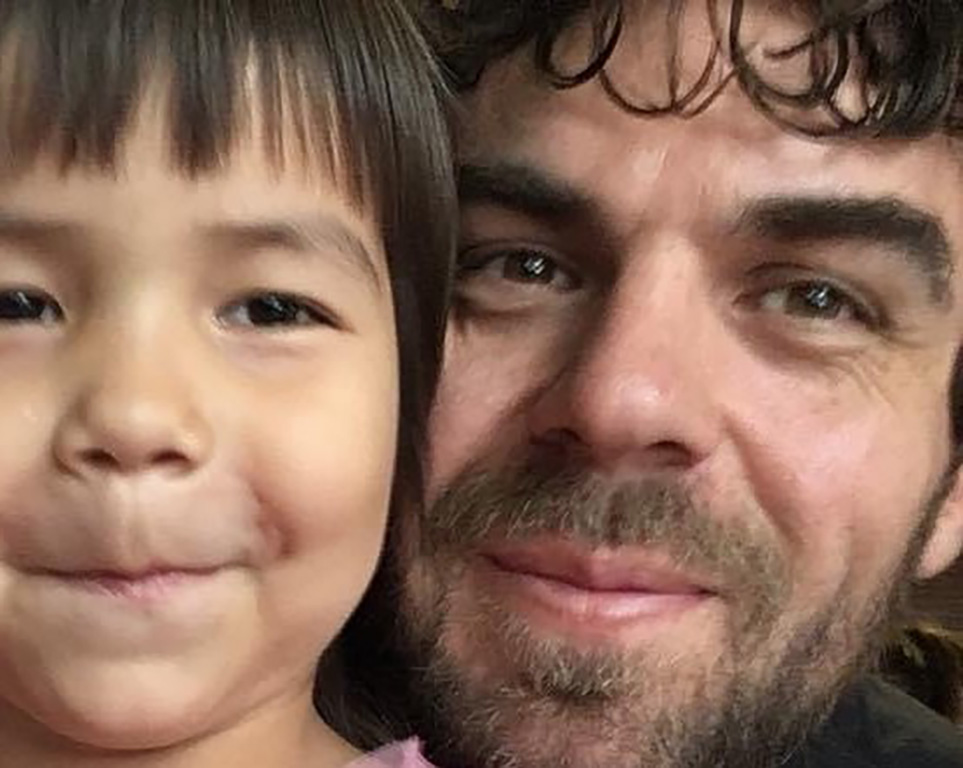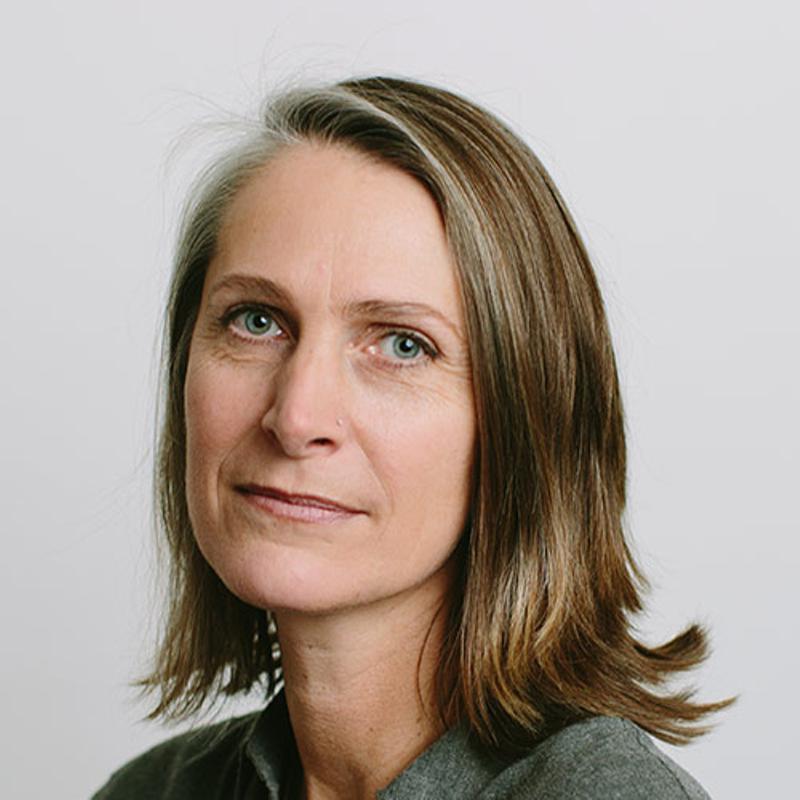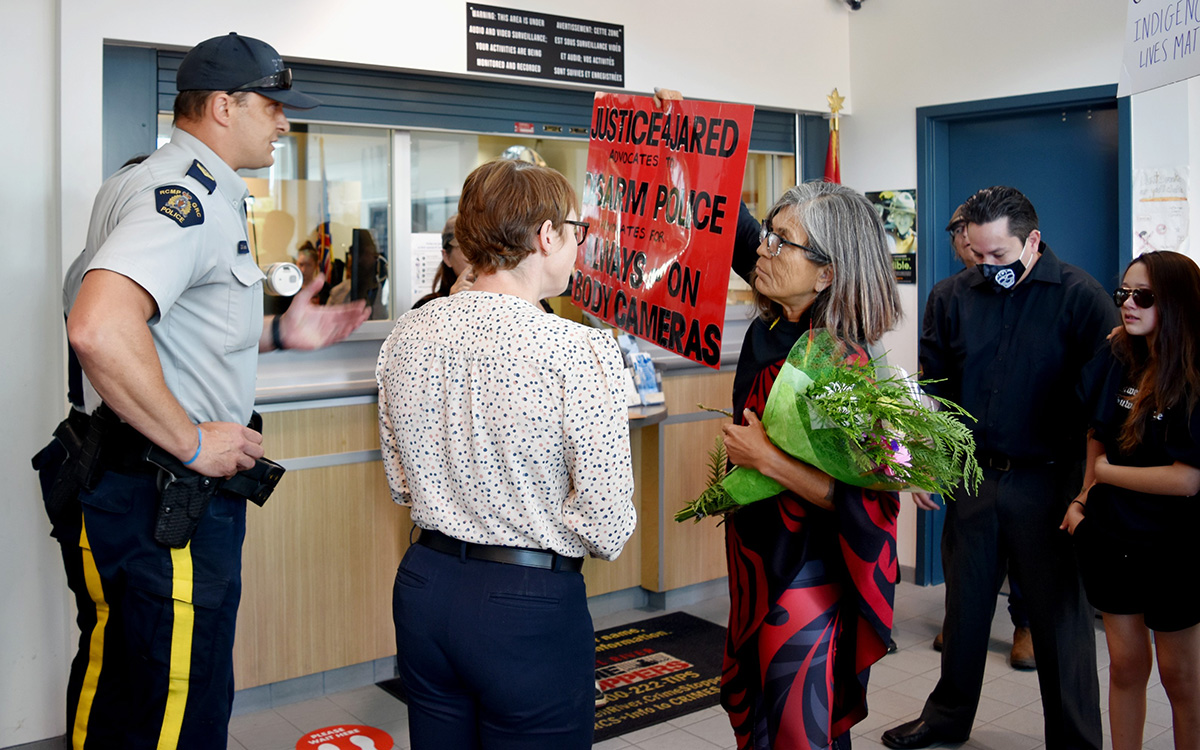After a year and a half of grief and frustration, there was a spirit of levity as family and supporters of Jared Lowndes gathered in Vancouver on Thursday to announce that B.C.’s police watchdog will recommend charges against three officers involved in the Wet’suwet’en man’s shooting death.
The Independent Investigations Office of BC, which investigates police incidents resulting in death or serious harm, released a statement earlier that day that it would file a report with Crown prosecutors recommending the charges.
It’s an incremental step in the family’s work to bring justice to Lowndes, who died on July 8, 2021, after he was allegedly cornered and shot by an RCMP in a Tim Hortons parking lot on Vancouver Island last year.
But those gathered made it clear that there is far more work to be done when it comes to holding police accountable for the high number of Indigenous people who die at the hands of police officers.
Speaking at the event, Laura Holland, Lowndes’s mother, started by acknowledging other families who have lost loved ones to excessive force by police. She promised the “beginning of a fight that’s going to last a long time” to change policies and laws to address the disproportionate number of Indigenous people killed by police across Canada.
“We’ve had enough,” Holland said. “Every single time we learn about an Indigenous murder by the police we will be saying something. We will make noise.”
Holland told the crowd gathered on Main Street in Vancouver’s Downtown Eastside that RCMP “tracked and brutally murdered” her son on the morning he died in Campbell River. The 38-year-old father, who Holland described as a “loving person,” left behind two young daughters.

“This should have never happened,” Holland said. “This is a call for justice. We will be fighting for months and years, whatever it takes, we’re going to fight this and we’re going to make sure that no more Indigenous people are shot, killed and hunted down.”
According to statements made by the IIO and RCMP at the time, police officers attempted to check a parked vehicle just before 5:30 a.m. on the day Lowndes died. The car drove away, making contact with the police cruiser as it left.
Police officers tracked down the vehicle, which Lowndes was driving, at a Tim Hortons in Campbell River at about 9 a.m., and boxed in the vehicle.
“During the interaction that followed, shots were fired by police, and the man was subsequently pronounced deceased,” the IIO said in yesterday’s statement. After completing its investigation, the office determined that “reasonable grounds exist to believe that three officers may have committed offences in relation to various uses of force.”
The IIO is preparing a report to be submitted to the BC Prosecution Service for consideration of charges in the coming months, it said. It added that it could not release more details while the case is with Crown prosecutors.
The BC Prosecution Service will only approve charges if there’s a substantial likelihood of conviction and if prosecution is in the public interest, the IIO added.
A police officer was also injured in the incident and a police service dog stabbed to death.
Holland said at the time that there was a warrant out for her son’s DNA, but that Lowndes had been acquitted of charges against him.
“Today the IIO made a decision to recommend charges against three of the officers,” Holland said Thursday afternoon. “We knew that they had done wrong. We knew that everything that they did that day was wrong. Now we have to wait for the Crown to make their decision.”
Holland also said her heart was with other families who had lost loved ones after interactions with the police. “My heart goes out to Julian Jones’ family. The IIO did not find any wrongdoing with the police.”
Julian Jones, 28, a member of Tla-o-qui-aht First Nation, was shot and killed by police on Feb. 27, 2021. Two weeks ago, the IIO released a statement saying it had cleared an RCMP officer of any wrongdoing in Jones’ death.
The Nuu-chah-nulth Tribal Council said in a statement it was “disillusioned, frustrated and devastated” at the IIO decision.
“Once again an RCMP officer killed a First Nation person without consequences,” it said. “There is always hope that the system will bring justice for a person killed by police, but the reality never lives up to this hope as the system is stacked against us.”
Jones’ death marked the second police shooting fatality of a Tla-o-qui-aht member by RCMP in nine months, it added. Chantel Moore was killed on June 4, 2020, when police entered her New Brunswick home to do a “wellness check.” The 26-year-old was shot four times after Moore allegedly advanced on the officer with a knife, according to a coroner’s inquest.
Prosecutors in New Brunswick announced in June 2021 that officers involved in Moore’s death will not face charges.
CTV News has reported that an Indigenous person is more than 10 times more likely to be shot and killed by police in Canada than a white person. It found that out of 66 people shot and killed by police between 2017 and 2020, 25 people — 40 per cent — were Indigenous.
Following Lowndes’s death, his aunt, Fay Blaney, told The Tyee that the family believed Lowndes was trying to protect his puppy, which was also in the car, when he stabbed the police dog.
She expressed grief and dismay that the loss of the RCMP service dog appeared to be considered more important than the loss of their loved one and said that media attention and ceremonies held for the dog have made the family a target for racist comments.
“This is a human being, a life that was lost, and he was loved,” Blaney told The Tyee at the time. “He was important. It was a lot of work to even bring any attention to this.”
The day of Lowndes’s death, the force issued a tribute to Gator, the dog killed in the incident, saying “our thoughts are with the injured handler and the Campbell River detachment at this time.” The same day, in a separate statement, it thanked the local community for a memorial that had been started outside the Campbell River detachment.
RCMP then held a funeral procession to honour the dog.
This past July, on the one-year anniversary of Lowndes’s death, RCMP issued a statement rebuking protests outside the Campbell River detachment, saying they were impeding traffic, occupying the parking lot and people were making derogatory comments toward police.
On Thursday, an RCMP spokesperson said in an email to The Tyee that the force would not be commenting on the IIO report.
Speaking at Thursday’s gathering, Union of BC Indian Chiefs Grand Chief Stewart Phillip described Lowndes’s death as a “needless tragedy” and credited Holland’s work to bring attention to it.
“I am very proud to stand here today in solidarity with the family,” Phillip said.
But he also spoke to the high number of police shootings and deaths of Indigenous people, saying he had “served notice” to the IIO yesterday afternoon that there “needs to be serious reform of the IIO in terms of holding police officers accountable.”
“The IIO, in my view, has failed to live up to their mandate to hold police agencies accountable,” he said. “We’re here today to say we’re not going to let this go.”
* Story updated on Dec. 2 at 2 p.m. to clarify the IIO report has not yet been sent to the BC Prosecution Service. ![]()
Read more: Rights + Justice

















Tyee Commenting Guidelines
Comments that violate guidelines risk being deleted, and violations may result in a temporary or permanent user ban. Maintain the spirit of good conversation to stay in the discussion.
*Please note The Tyee is not a forum for spreading misinformation about COVID-19, denying its existence or minimizing its risk to public health.
Do:
Do not: